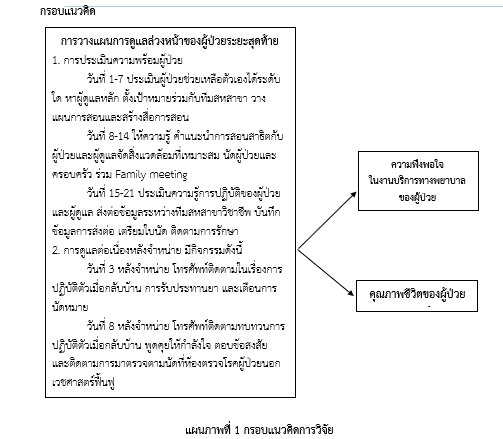ผลของการวางแผนการดูแลล่วงหน้าต่อการดูแลในวาระสุดท้ายของชีวิตในหอผู้ป่วยใน โรงพยาบาลสามร้อยยอด อำเภอสามร้อยยอด จังหวัดประจวบคีรีขันธ์
คำสำคัญ:
การวางแผนการดูแลล่วงหน้า, ผู้ป่วยระยะสุดท้าย, ความพึงพอใจ, คุณภาพชีวิตบทคัดย่อ
การวิจัยในครั้งนี้เป็นการวิจัยกึ่งทดลอง (Quasi - Experimental Research) โดยใช้แบบการวิจัยแบบ 2 กลุ่ม (Posttest-only design with nonequivalent groups) เพื่อเปรียบเทียบความพึงพอใจในบริการ และเปรียบเทียบคุณภาพชีวิตของผู้ป่วยระยะสุดท้ายระหว่างก่อนและหลังการใช้รูปแบบการดูแลผู้ป่วยระยะสุดท้ายแบบบูรณาการ วัดผลครั้งเดียวภายหลังได้รับการวางแผนจำหน่าย 2 สัปดาห์ เปรียบเทียบกันระหว่างก่อนและหลังการทดลอง ใช้สถิติ Independent t–test และ เปรียบเทียบความแตกต่างของค่าเฉลี่ยคะแนน กลุ่มตัวอย่างจำนวนทั้งสิ้น 30 คน โดยเป็นกลุ่มก่อนการทดลองและกลุ่มหลังการทดลองกลุ่มละ 15 คน
ผลการศึกษาพบว่า ค่าเฉลี่ยคะแนนความพึงพอใจในบริการพยาบาลภาพรวม ระหว่างก่อนและหลังการใช้รูปแบบการดูแลผู้ป่วยระยะสุดท้ายแบบบูรณาการ กลุ่มก่อนการทดลองมีค่าเฉลี่ยคะแนนแตกต่างกับหลังการทดลอง อย่างมีนัยสำคัญทางสถิติ (p-value >0.001; 95%CI: -26.53 ถึง -19.61) ค่าเฉลี่ยคะแนนคุณภาพชีวิตหลังจำหน่ายด้านคุณภาพชีวิตโดยรวม ระหว่างก่อนและหลังการใช้รูปแบบการดูแลผู้ป่วยระยะสุดท้ายแบบบูรณาการ พบว่า กลุ่มก่อนการทดลองมีค่าเฉลี่ยคะแนนแตกต่างกับหลังการทดลอง อย่างมีนัยสำคัญทางสถิติ (p-value >0.001; 95%CI: -47.56 ถึง -26.57) เห็นได้ว่าการวางแผนการดูแลล่วงหน้าต่อการดูแลในวาระสุดท้ายของชีวิตในหอผู้ป่วยนี้ สามารถเพิ่มความพึงพอใจในงานบริการและเพิ่มคุณภาพชีวิตที่ดีขึ้นของผู้ป่วยได้

ดาวน์โหลด
เผยแพร่แล้ว
รูปแบบการอ้างอิง
ฉบับ
ประเภทบทความ
สัญญาอนุญาต
ลิขสิทธิ์ (c) 2024 https://www.tci-thaijo.org/บทความในวารสารนี้มีลิขสิทธิ์โดยและเผยแพร่ภายใต้สัญญาอนุญาต Creative Commons แบบแสดงที่มา-ไม่ใช้เพื่อการค้า-ไม่ดัดแปลง 4.0 ระหว่างประเทศ (CC BY-NC-ND 4.0)
สามารถอ่านและนำไปใช้เพื่อวัตถุประสงค์ทางวิชาการ เช่น การสอน การวิจัย หรือการอ้างอิง โดยให้เครดิตแก่ผู้เขียนและวารสารอย่างเหมาะสม
ห้ามใช้หรือดัดแปลงบทความโดยไม่ได้รับอนุญาต
ข้อความที่ปรากฏในบทความเป็นความคิดเห็นของผู้เขียนแต่เพียงผู้เดียว
ผู้เขียนต้องรับผิดชอบต่อเนื้อหาและความถูกต้องของบทความของตนทั้งหมด
การนำไปใช้ซ้ำหรือเผยแพร่ซ้ำในรูปแบบอื่นต้องได้รับอนุญาตจากวารสาร


